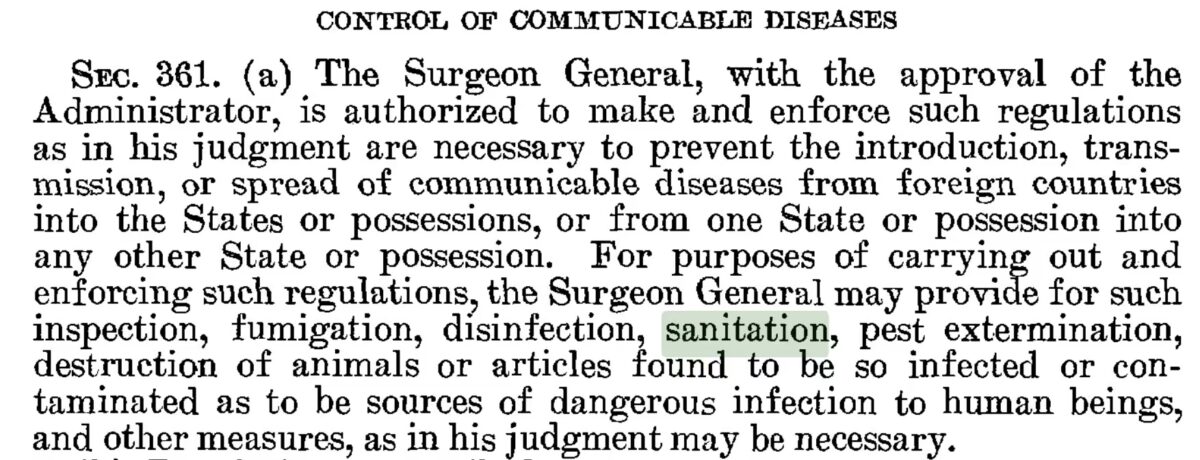The Sanitation Power Does Not Permission Tyranny
Distressed Patriotic Flag Unisex T-Shirt - Celebrate Comfort and Country $11.29 USD Get it here>>

Commentary
What do you think of when you think of sanitation? Perhaps the Sanitarian Department, which picks up trash. That’s what American English conveys. It deals with rubbish and refuse in order to dispose of it. Or maybe sanitation brings to mind cleaning something like the bathroom. Still, it’s a bit odd to use the word that way. The household member who cleans the kitchen is not normally called a sanitation person.
All of this matters because the Biden administration is arguing that the sanitation powers of the 1944 Public Health Services Act grant the CDC the right to force a mask on you. When they imposed the edict in January 2021, they didn’t cite that power but in court challenges, they scoured the text and came up with it. This forced the court to decide the meaning of the phrase. That is still in dispute.
Here is the text in question:
It’s pretty clear that we are talking about boatloads of foreign trash that might be imported to the shores carrying every manner of disease. The idea is that the government has the power to block it. I would like to see the whole act repealed—the United States got by for a long time without this power—but that’s an argument for another day. What matters now is that it is an astonishing stretch to say that this power extends to dictating face coverings for everyone.
Just who is being sanitized here? The plane, bus, or boat is presumably being sanitized by restricting your poison breath. But what if you are not sick? Doesn’t matter. Maybe you need to be sanitized from other people’s poison breath. Of course the mask does nothing of the sort but that’s a side issue. At question here is the power itself and the CDC’s legal right to make such a decision on its own.
The word itself got me thinking of its roots. Etymologically, the word has a number of iterations. Think of sanitize or sanitizer, the stuff people doused themselves with for two years while thinking that they were killing COVID even though it spreads not through surfaces but through aerosols. The word is also related to sane and insanity, as in one’s mind is in need of some kind of cleaning.
The root of the word is Latin: sanitas which means clean but a deep root is sanus which refers to health generally, mind, body, and maybe soul. A related derivation is the Latin Sanctus which means holy and apart, as in sanctuary, sanity, and sanctimonious. We can see, then, the easy identification of physical and spiritual health. Hence, the famous statement by the founder of Methodism: cleanliness in next to godliness. It seems true enough but can also lead to confusion: unclean/immoral/diseased; clean/moral/healthy. For hundreds and thousands of years, these words have bled into each other, fomenting every kind of dangers including institutionalized segregation and wanton cruelty toward the sick.
And speaking of bleeding, consider the word Sanguine, which is word we sometimes use but it refers also to a medieval temperament meaning that one is driven by the blood (Sanguine in Latin). When one got sick, it was believed that this was due to bad blood. One’s health (sanus) was compromised by the blood (sanguine), and hence the belief that bloodletting is a sure cure for every kind of malady, a practice that lasted into the 19th century with the use of leeches.
The conflation of ill health and immorality, both traceable to bad blood, is a persistent feature of history, as we learn from the Bible. Perhaps it made some sense for the lepers to be excluded from temple life but for how long? Decades? They had to undergo a ritualistic cleansing and blessing to reenter. This is a service that Jesus provided and it variously got him in some trouble.
This cleansing feature of religious practice shows itself in the use of holy water in Christian worship too. It is sprinkled in the final blessing and deployed in foot-washing ceremonies at the end of Lent in order to symbolically cleanse the body and soul to prepare for the experience of salvation.
The slippery use of terms here both created and reinforced the conflation of morally bad and physically sick. And this further led to tremendous abuses of the quarantine power. The famous case of “Typhoid Mary” led this poor Irish immigrant to be scapegoated for all the remaining typhus in New York even though it had been on the decline for decades and there were many hundreds of other carriers extant. She spent a total of 30 years in isolation and furthered the stereotype of the Irish being dirty disease spreaders and also degraded sexual sinners and hence their large families.
Part of the major burden of public health in the late 19th century was to decouple the identification of sickness with being unclean and with sin, with the main focus on the science of sanitation, personal hygiene, and cleaner food and water. Public health worked very hard to bring science to bear on the problem of disease, and a key feature of that was an attempted end to the ancient practice of morally stigmatizing the sick.
Around the same time, the work of Sigmund Freud at his best was to do the same with psychology. Abnormal behavior, in his theory, was neither the result of a physical malady or a moral problem—as the roots of the word “insane” might suggest—but rather a malfunctioning of the psyche that could be rectified through therapy that was neither physically invasive nor morally judgmental. Looked at this way, his achievement was consistent with liberal ideals.
All of this was erased with the demonization of the unmasked and the unvaccinated, both of whom were scapegoated for disease and also considered immoral due to their noncompliance. There was even a time early on when just catching COVID was regarded as a sign that you either did something bad or hung around with other bad-behaving people. This was all very dangerously close to reviving medieval and ancient superstitions.
So as you can see, the enlargement of the term sanitation beyond its vernacular meaning is fraught with danger. Indeed, it threatens to undermine all the achievements of public health over a century. Perhaps, then, it stands to reason that the CDC, which got so much wrong during the pandemic, would now be trying to convince us that a power designed to protect us from foreign disease-carrying rubbish would entitle them to make us cover up our faces and inhibit our ability to breath or communicate through non-verbal signals.
It’s a gravely dangerous argument to make but they are making it anyway. Is bloodletting next? On the current trajectory to “go medieval” on viruses, we should not be surprised. And yet, that would be literally insane, unhealthy, and thoroughly evil.
From the Brownstone Institute
Views expressed in this article are the opinions of the author and do not necessarily reflect the views of The Epoch Times.





